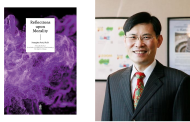Professor Yongjae Lee and his research team from the Department of Industrial Engineering at UNIST have been honored with the prestigious MK Young Scholar Paper Award by the Korean Academic Society of Business Administration (KASBA). The award recognizes outstanding contributions in the field of business administration, highlighting innovative research leveraging artificial intelligence (AI) to enhance financial investment performance.
The award ceremony took place at the 27th KASBA Convergence Conference, held at the Ulsan Exhibition and Convention Center (UECO) on July 20, 2025. The event is conferred upon emerging scholars demonstrating both significant academic contributions and promising potential for future growth.
This year’s conference, themed “Value-Up Business Innovation in the AI Era,” featured a record-breaking lineup of 50 academic societies and 347 presented papers, exemplifying the vibrant spirit of innovation within the Korean management community.
The award-winning paper, titled “Decision-informed Neural Networks with Large Language Model Integration for Portfolio Optimization” was carried out in collaboration with Associate Professor Stefan Joren, Dr. Yuntae Hwang, and Ph.D. candidate Yaxuan Kong from Oxford University. The research was recognized for its novel approach to designing portfolio decision models that incorporate large language models (LLMs) to directly inform investment strategies.
Traditional portfolio optimization methods rely heavily on return prediction models, which often fall short of translating into actual investment success due to their inability to incorporate real-world market complexities—such as price volatility, strategic considerations, and macroeconomic factors.
In response, Professor Lee’s team introduced an advanced model integrating LLM-based expression learning and attention mechanisms. This approach captures asset interactions, time-series patterns, and external variables, providing a comprehensive view of market dynamics. The model’s loss function was also tailored to reflect actual investment performance, not just prediction error.
The effectiveness of this approach was validated through experiments using the S&P 100 and the Dow 30 indices. The proposed Decision-Informed Neural Network (DINN) outperformed conventional deep learning models by increasing the sharpe ratio and reducing volatility. Additionally, gradient-based attribution analysis demonstrated that the model sensitively identified assets contributing most to investment success, offering transparent insights into decision-making factors.
This research exemplifies a practical AI application that bridges the gap between predictive modeling and real-world investment decisions. It also highlights the expanding role of LLMs beyond natural language processing, showcasing their potential to inform complex financial strategies.
Professor Lee remarked, “While many focus on predictive accuracy in AI-driven finance, the inherent uncertainties of markets limit this approach. Our work emphasizes decision-oriented predictions and leverages LLMs to incorporate broader contextual information, which I believe is a promising direction for future research and industry applications.”
The recognition by KASBA underscores the significance of integrating advanced AI techniques into financial decision-making, paving the way for innovative approaches at the intersection of financial engineering and AI.






![[2026 UNIST Matriculation] “Design Questions the World Has Never Seen!”](https://news.unist.ac.kr/wp-content/uploads/2026/02/사진-박종래-UNIST-총장이-2026년-입학식사를-전하고-있다-1-1-190x122.jpg)
![[2026 UNIST Commencement] “Become Way Makers Who Open Paths Where None Are Drawn!”](https://news.unist.ac.kr/wp-content/uploads/2026/02/사진-박종래-총장이-UNIST-학위수여식사를-전하고-있다-3-1-190x122.jpg)
![[2026 UNIST Commencement] Voices of Class of 2026](https://news.unist.ac.kr/wp-content/uploads/2026/02/Untitled1-190x122.jpg)



